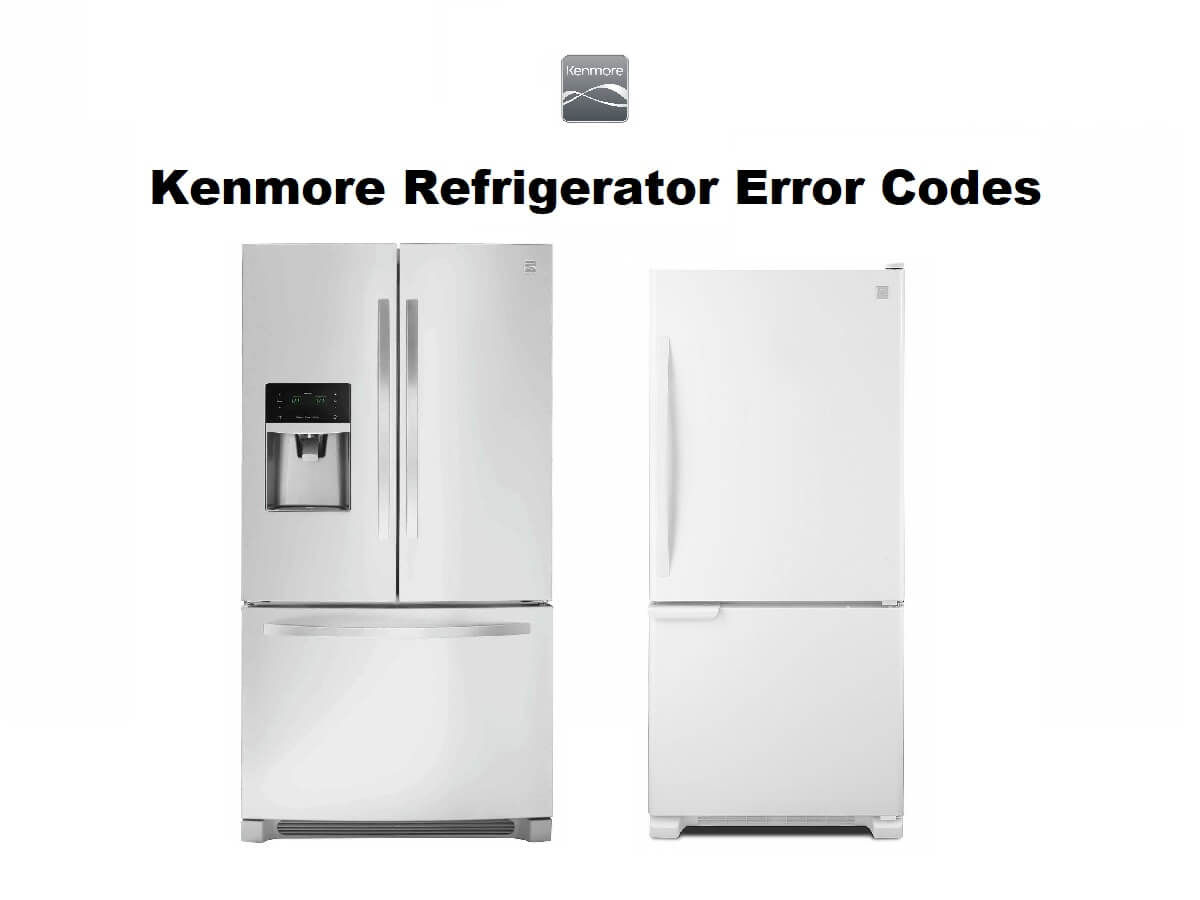Kenmore refrigerators communicate various issues to users through error codes. These codes can indicate a range of problems, from elevated internal temperatures to water leakage. When users encounter these codes, seeking technical support promptly is essential for efficient repairs. This ensures the refrigerator’s longevity and proper functioning.
Most Common Codes
Below is a list of some of the possible malfunctions. To help you out we have listed down some of the most common error codes for Kenmore Refrigerator. The below are common fault diagnosis and elimination methods. For other faults, please contact customer service. Do not forget to write to us the fault codes that you cannot find.
Er-FS: Freezer Sensor Error
Er-rS: Refrigerator Sensor Error
Er-dS: Defrosting Sensor Error
Er-IS: Icing Sensor Error
Er-dH: Poor Defrosting
Er-IF: Abnormality of BLDC FAN Motor for Ice Making
Er-FF: Abnormality of BLDC FAN Motor for Freezer
Er-CF: Abnormality of BLDC FAN Motor for Mechanic Room
Er-CO: Communication Error
Parts Meaning
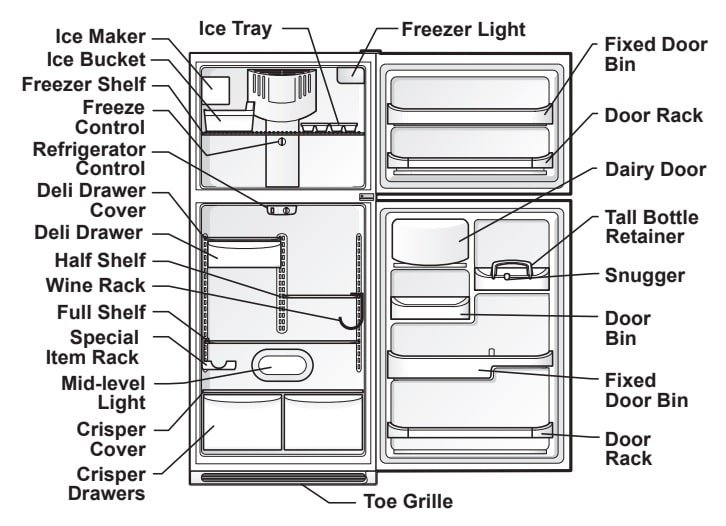
How to FiX?
When you check the Resistance values, be sure to turn off the power. And wait for the voltage-discharge sufficiently.
Er FS
Freeze Temperature: Er
Ref. Temperature: FS
Error Generation Factors: Short or Disconnection of Freezer Sensor
Remark: Check each sensor and its connector.
Error Detection Category: Freezer Sensor Error
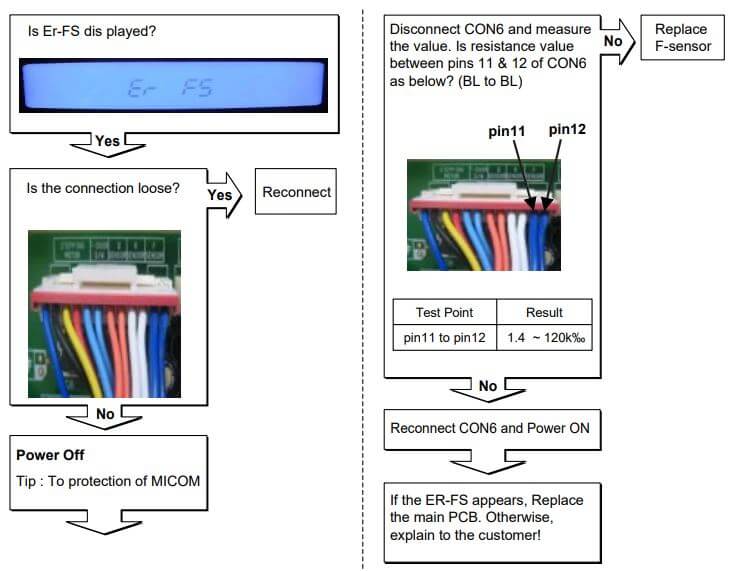
Er rS
Freeze Temperature: Er
Ref. Temperature: rS
Error Generation Factors: Short or Disconnection of Refrigerator Sensor
Remark: Check each sensor and its connector.
Error Detection Category: Refrigerator Sensor Error
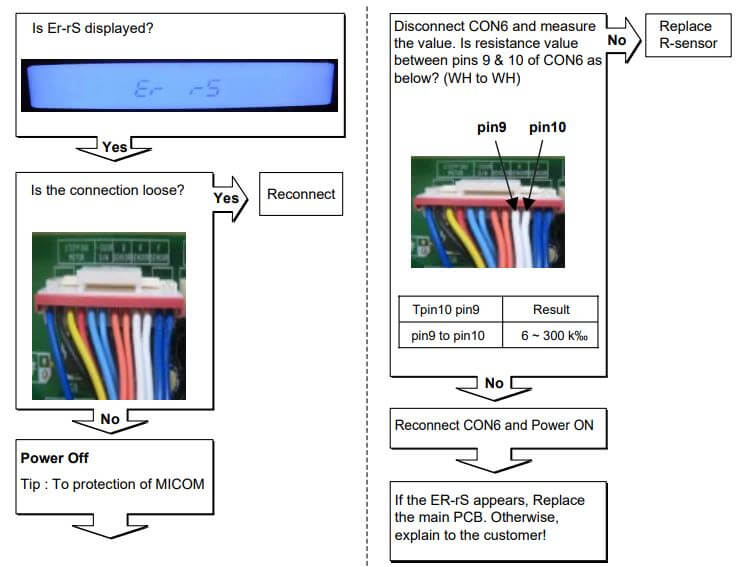
Er dS
Freeze Temperature: Er
Ref. Temperature: dS
Error Generation Factors: Short or Disconnection of Defrosting Sensor
Remark: Check each sensor and its connector.
Error Detection Category: Defrosting Sensor Error
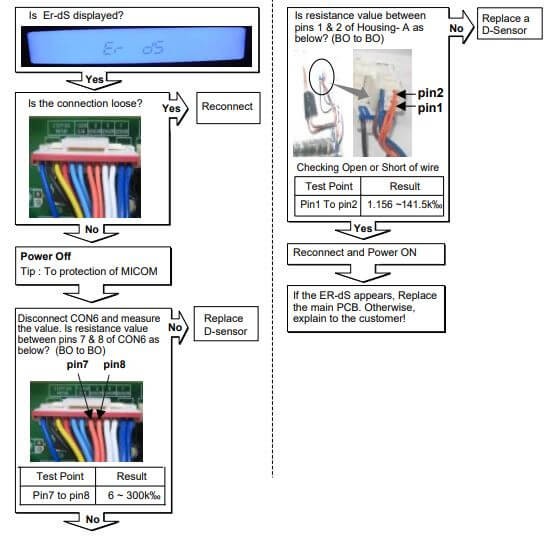
Er IS
Freeze Temperature: Er
Ref. Temperature: IS
Error Generation Factors: Short or Disconnection of Icing Sensor
Remark: Check each sensor and its connector.
Error Detection Category: Icing Sensor Error
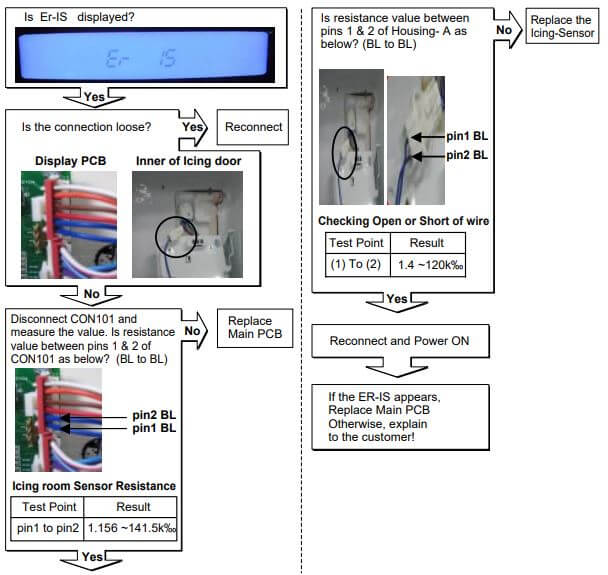
Er dH
Freeze Temperature: Er
Ref. Temperature: dH
Error Generation Factors: Even though it is passed 1 hour since then Defrosting , if Defrosting sensor is not over 8°C, it is caused
Remark: Temperature Fuse Disconnection, Heater disconnection, DRAIN Jam, Poor Relay for Heater
Error Detection Category: Poor Defrosting
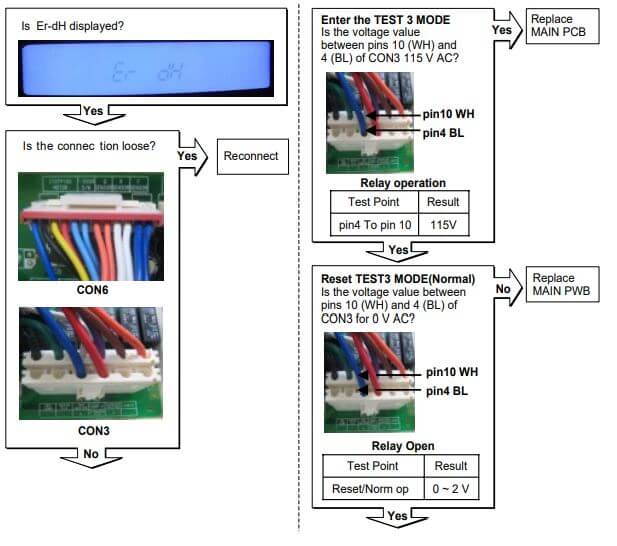
Er IF
Freeze Temperature: Er
Ref. Temperature: IF
Error Generation Factors: It is caused when feedback signal isn’ t over 115 seconds during BLDC FAN motor operating
Remark: Poor BLDC Motor connection, DRIVE IC, and TR Tx/Rx between icemaker and main board.
Error Detection Category: Abnormality of BLDC FAN Motor for Ice Making
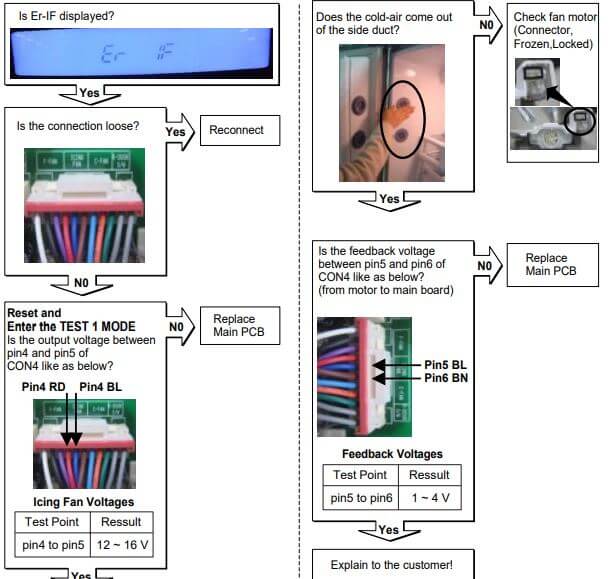
Er FF
Freeze Temperature: Er
Ref. Temperature: FF
Error Generation Factors: It is caused when feedback signal isn’ t over 115 seconds during BLDC FAN motor operating
Remark: Poor BLDC Motor connection, DRIVE IC, and TR Tx/Rx between icemaker and main board.
Error Detection Category: Abnormality of BLDC FAN Motor for Freezer
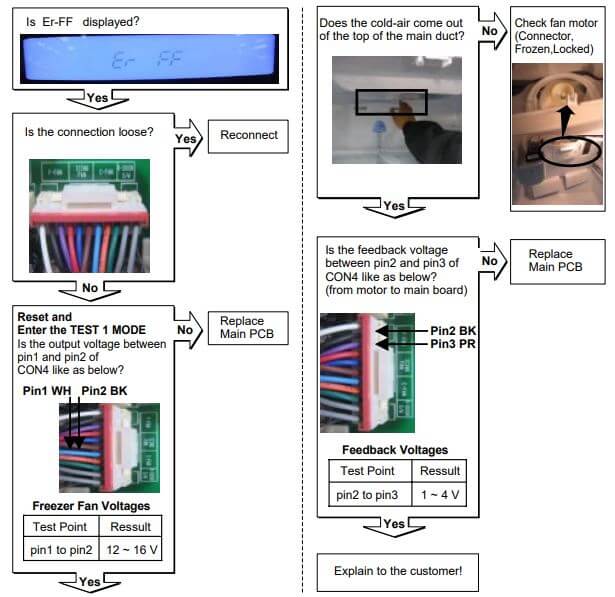
Er CF
Freeze Temperature: Er
Ref. Temperature: CF
Error Generation Factors: It is caused when feedback signal isn ’ t over 115 seconds during BLDC FAN motor operating
Remark: Poor BLDC Motor connection, DRIVE IC, and TR Tx/Rx between icemaker and main board.
Error Detection Category: Abnormality of BLDC FAN Motor for Mechanic Room
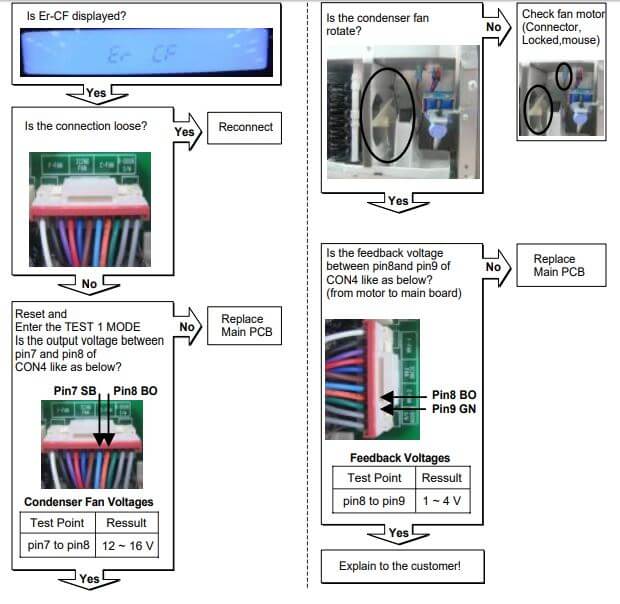
Er CO
Freeze Temperature: Er
Ref. Temperature: CO
Error Generation Factors: Communication Error between Micom of Main PCB and Display Micom
Remark: Poor Communication connection,Poor TR of Transmitter and Receiver Tx/Rx between icemaker and main board.
Error Detection Category: Communication Error
Troubleshooting
Before calling for service, review this list. It may save you time and expense. This list includes common occurrences that are not the result of defective workmanship or materials in this appliance.
Problem: Ice maker is not making any ice.
Cause:
- Ice maker wire signal arm is in the “up” or OFF position.
- Household water line valve is not open.
- Freezer is not cold enough.
- Saddle valve on cold water pipe is clogged or restricted by foreign material.
Correction:
- Move wire signal arm to the “down” or ON position (side mounted).
- Turn on household water line valve.
- See PROBLEM column TEMPERATURES ARE TOO WARM.
- Turn off household water line valve. Remove valve. Ensure that valve is not a self-piercing saddle valve. Clean valve. Replace valve if necessary.
Problem: Ice maker is not making enough ice.
Cause:
- Ice maker is producing less ice than you expect.
- Freezer is not cold enough.
- Household water line valve is not completely open.
Correction:
- The ice maker will produce 2 to 3 pounds of ice every 24 hours depending on usage conditions. Ice is produced at a rate of 8 cubes every 75 to 160 minutes.
- See PROBLEM column TEMPERATURES ARE TOO WARM.
- Turn on household water line valve.
Problem: Ice maker will not stop making ice.
Cause: Ice maker wire signal arm is being held down by some item in the freezer
Correction: Move item and release wire signal arm. Remove any ice cubes that are frozen together over the wire signal arm
Problem: Ice cubes are freezing together.
Cause:
- Ice cubes are not being used frequently enough.
- Freezer control is set too warm.
- Very little food in freezer.
Correction:
- Remove ice container and discard ice from container. Ice maker will produce fresh supply.
- Set freezer control to colder setting. Allow 24 hours for temperature to stabilize.
- Add more food to freezer.
Problem: Ice has bad odor and taste.
Cause:
- Ice has picked up odor or flavor from strong food stored in refrigerator or freezer.
- Water running to ice maker has poor taste or odor.
- Ice not used frequently enough.
Correction:
- Cover foods tightly. Discard stale ice. Ice maker will produce fresh supply. Replace air filter (available in select models).
- Add filter to water supply line. Consult a water purifying company.
- Discard stale ice.
Problem: Light bulb is not on.
Cause:
- Light bulb is burned out.
- No electric current is reaching refrigerator.
Correction:
- See Replacing Light Bulbs in NORMAL OPERATING SOUNDS section.
- See PROBLEM column RUNNING OF REFRIGERATOR.
Problem: Interior is dirty.
Cause:
- Interior needs to be cleaned.
- Food with strong odors is in refrigerator
Correction:
- See table of Care and Cleaning Tips in CARE & CLEANING section.
- Cover food tightly.
Problem: Door(s) will not close.
Cause:
- Door was closed too hard, causing other door to open slightly.
- Refrigerator is not level. It rocks on the floor when moved slightly.
Correction:
- Close both doors gently.
- Ensure floor is level and solid, and can adequately support the refrigerator. Contact a carpenter to correct a sagging or sloping floor.
Problem: Drawers are difficult to move
Cause:
- Food is touching shelf on top of drawer.
- Track that drawers slide on is dirty.
Correction:
- Remove top layer of items in drawer.
- Ensure drawer is properly installed on track.
- Clean drawer, rollers, and track. See table of Care and Cleaning Tips in CARE & CLEANING section.
Problem: Compressor does not run
Cause:
- Refrigerator is in defrost cycle.
- Plug at electrical outlet is disconnected.
- House fuse blown or tripped circuit breaker.
- Power outage.
Correction:
- This is normal for a fully automatic defrost refrigerator. The defrost cycle occurs periodically, lasting about 30 minutes.
- Ensure plug is tightly pushed into outlet.
- Check/replace fuse with a 15 amp time-delay fuse. Reset circuit breaker.
Manual Pdf
Kenmore Refrigerator Manual PDF
Kenmore Bottom Freezer Refrigerator Refrigerador Congelador Inferior PDF

